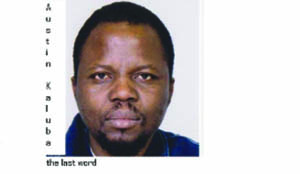 Sometime back in the mid-1980s, a British reggae band UB 40 sang an anti-apartheid song featuring the ANC rallying cry of “Amandla Awethu.”
Sometime back in the mid-1980s, a British reggae band UB 40 sang an anti-apartheid song featuring the ANC rallying cry of “Amandla Awethu.”
Although the protest song with lines on building one’s own society and singing one’s song is about apartheid, it can apply to Africa at large.
As Africans, building our own societies based on our values has eluded us since we came across Europeans who defined our nations.
One of the greatest problems of African societies’ inability to develop and to create worthwhile nations is the way in which they accepted colonial rule.
Comparatively, no other continent was more fitted to welcome the conqueror’s values like Africa.
Since our contact with the West, many African societies voluntarily discarded their heritage and oneness and submitted to colonial rule.
This submission continued long after independence, making us under control of someone else. It is this inability to come up with our own African identity or to ‘sing our own songs’ according to UB 40 that has made us culturally lost.
Unlike Arabs and people from the eastern world, most of the things we do are inherited or closely linked to our former colonial masters.
This includes our judicial systems, politics, dressing, mannerisms, religion and even language.
As Africans, we are fond of imitating our former masters whose language, traditions and customs we have copied poorly coming up with caricature nations.
What we usually forget is that we can fit in the modern world but retain our African heritage. Look at the Chinese and Arabs, their heritage is visible despite retaining universal modern norms.
The western education has tacitly taught us how to mimic coming up with poor versions of everything we imitate starting from language which is an imperfect brand to other borrowed tendencies, customs and ideas.
Mimicry of the western cultures constantly appears in Africa with the pressure of the present times, especially in the domains where the country is incapable of offering its own device.
It is only when you go out and see the people we poorly imitate to realise how comical our efforts are.
Though I know I am not a professional sociologist or a dedicated reformer but simply a writer I am shocked by the bureaucracy, the paper work and the substitution of symbols for straight action.
It is this crudeness and unsophistication of many things around me done in trying to be white that is more painful to me.
Sociologists have discovered that there are no people without traditions since it is the lifeblood of a people. A people who refuse to express its love and appreciation for its tradition will die because if you are not expressing your own, you are participating in and expressing tradition of others usually foreigners.
Contrary to what western education has taught us, no person is devoid of an attachment to some cultural source of knowledge. Whose songs are we singing then?
We know little about our own African heritage than our conquerors who recorded it selectively. This is dangerous since we have often lost our memories and accepted the values and norms of those who enslaved and colonised us.
Can’t we copy from the Chinese and the Indians who have fought hard to keep at bay these destructive norms that Africans have readily embraced?
Even the version of the Christianity we copied is diluted by wrong western norms since those who speak to us of Christian morals are responsible for defiling our ways of life.
To quote Malcolm X ‘the world pushes the African around because we give the impression that we are chumps, not champs, but chumps, weaklings, falling over ourselves to follow other people rather than our own traditions.’
Coming back to what sociologists and other social scientists who study human development have found, no society can advance without addressing it’s identity.
As Africans, our identity is murky since it is entwined with that of our colonial masters creating a hybrid identity that is difficult to define.
Until we change this through meaningful education, we will never create our own societies based on African norms and values.
We will instead remain trapped at many levels and to undo this, we urgently need to create our African persona and distinctiveness in all spheres like art, medicine, education, science, and even religion.
As Bob Marley reminded us, we have to jettison all vestiges of mental enslavement that perpetually keep us imitating the western world.
Only then can we sing our own songs.






